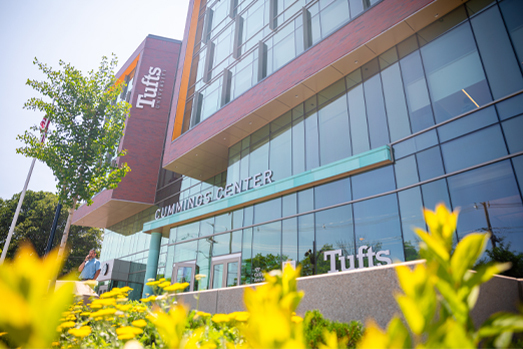MASTER OF SCIENCE IN
Electrical Engineering
Do Great Things with Tufts
At Tufts, you’ll be trained to excel in electrical engineering fields that range from image and signal processing to nanoscale engineering. Our graduates go on to do great things, founding start-ups, advancing society and industry, and studying in highly-ranked PhD programs—all endeavors supported by their Tufts education.
ENTRY TERMS:
- Fall
- Spring
APPLICATION DEADLINES:
- Fall: January 15
- Spring: December 1 (domestic applicants only)
Ready to take the next step?
For more information about the MS in Electrical Engineering program, including application requirements, please complete the form below.
ENTRY TERMS:
- Fall
- Spring
APPLICATION DEADLINES:
- Fall: January 15
- Spring: December 1 (domestic applicants only)
Engineer Across Disciplines
With vibrant research exploring fields from power-aware computing, nano- and opto-electronics, and photonics to information theory, machine learning, and robotics and control systems, there is something for everyone in our electrical engineering program. Our faculty members work with colleagues in the School of Medicine and the School of Arts and Sciences—and collaborate across departments in the School of Engineering—focusing on strategic research areas such as human health and bioengineering, intelligent systems, and the interactions between technology and people.
Choose Your Area of Study
Forget everything you've heard about engineering programs that limit you to a narrow path of study or offer only large lecture-hall courses. We do things differently at Tufts. In our electrical engineering program, you’ll join small classes and immerse yourself in cutting-edge, interdisciplinary research led by innovative faculty. Earn your master’s in electrical engineering with a focus on any of these research areas:
- Control, energy systems, and robotics
- Electro-optical materials and renewable energy
- Integrated circuits and VLSI
- Microfabrication, nanotechnology, and sensors
- Networks and information theory
- Signal and image
$115,680
The average salary for an electrical and electronics engineer in the United States*
*Source: bls.gov
98%
of Tufts School of Engineering graduates had secured employment or received a job offer at the time of graduation
125,000+
Join a network with 125,000+ Tufts University alumni
2
Convenient schedules, full-time or part-time
“From nanoelectronics to microplasma sensors, wireless communications systems and smart grids to solar cells, environmental imaging to robotics—it's happening here.”
–Professor and Department Chair Tom Vandervelde, Electrical and Computer Engineering
Program Highlights
- Small class sizes
- Personalized path of study
- Real-world projects and internship opportunities
- Mentorship from professors at the top of their fields
- Collaborative research that crosses disciplines
- Five miles from the high-tech hub of Boston
- One-on-one career advising and workshops
- Extensive professional development training and resources
GRE Waived
Earn Two Degrees in Just 2 Years
Where Can You Go From Here? Anywhere You’d Like.
Careers for graduates include:
- Electrical engineer
- Electronics engineer
- Aerospace engineer
- Robotics engineer
- Renewable energy engineer
Source: bls.gov

Graduate Cooperative Education (Co-Op) Program
Discover Academic Excellence

About Tufts University
At Tufts, you’ll work with world-renowned engineering faculty at the top of their disciplines. Combine classroom teaching and hands-on learning to earn a degree that will prepare you for success. Take advantage of Tufts’ dedicated career and networking resources, explore the Tufts campus just a few miles from the high-tech hubs of Boston and Cambridge, and get ready for the next step in your professional life.
